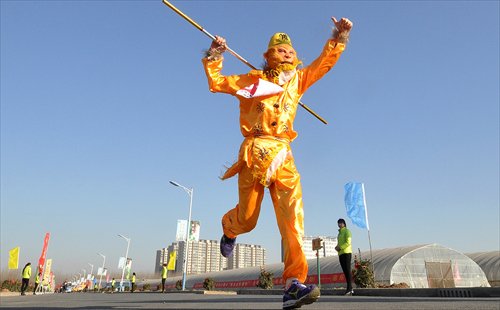Running on passion
Lifestyle changes prompt surge in sport’s popularity

A man dressed like the Monkey King runs in Handan, Hebei Province on December 31, 2014. Photo: CFP
Ten years ago, anyone who said his favorite sport was running would have drawn ridicule from most Chinese people. Nowadays, however, if someone tells his friends that he has a deep love for the sport, he will most likely be met with widespread agreement.
One of the most enthusiastic and persistent backers of running is Chen Penbin, a tough man with ebony skin, deep eyes and a bright smile, who made an unprecedented achievement on Friday.
The Zhejiang native accomplished the incredible feat of completing 100 marathons in 100 days. "How about running with me when I'm 100 years old!" the rising star joked with fans after completing his 92nd marathon. He is also the first man in the world to have run ultra-marathons on all seven continents.
While it sounds too crazy to be true, every step of this legendary adventure has been shared on his webcast. "Every step of running changes my life," Chen said.
Changing lives
Running is also changing the lives of many ordinary Chinese people. Every morning and evening, countless runners in different cities take the first step toward their own destinies. According to the Chinese Athletic Association, there will be 56 marathons held in China this year, five more than in 2014, and more than twice as many than in 2011.
When the Beijing Marathon made its debut in 1981, only 80 runners participated in it. In the early years of the event, organizers pinned their hopes for attendance on large enterprises encouraging their employees to take part. But in recent years, the situation changed dramatically. Only those selected through a lottery process can now earn a place in the race. Only 14.2 percent of applicants had the opportunity to stand on the starting line of the 2014 Beijing half-marathon, one of the sub-activities of the Beijing event.
At the same time, there are countless other recreational running activities taking place across the country, making people happier and healthier. Although there aren't any official statistics reflecting the exact number of people who participated in running activities in China, other indicators show just how much the popularity of running has gained nationwide.
When runners complete their courses, most will immediately take to social media and show off the routes they have run and the pictures they have taken along the way. Not surprisingly, their online friends will praise their achievements.
According to incomplete statistics, more than 100 apps have been developed for Chinese runners. Some of them have already seen 5 million downloads or even more. What's even more surprising is that they achieved these goals in such a short time, and they all have even larger ambitions in the market. Thanks to these apps, it is not difficult to imagine that even the most introverted people in China can find friends in their circle who like running.
But the question remains: Why have so many Chinese people taken up running? "It is because of social and economic development and the improvement of people's material and cultural lives," according to Wang Dawei, vice-president of the Chinese Athletic Association, who has been organizing marathons for more than 12 years. "More and more people have extra time and money."
Bright prospects
Compared with the US, where running is more popular, Chinese running activities remain at a relatively low level. However, many believe that the industry has brighter prospects over the next decade.
Top-level Chinese runners are lighting up this future more quickly than most imagine. According to reports, some Chinese running enthusiasts will spend over 1 million yuan ($161,000) on running equipment throughout their lives.
Their counterparts in the US also prove that trend. Further research into the US running industry showed that the most significant group of runners is made up of highly educated and wealthy people. Over 74 percent of them hold college degrees, and 72 percent of them earn an annual income of $75,000.
The same thing is happening in China. Few runners think of running as just a spur of the moment idea. Many runners are high-income earners, such as executives, celebrities and business icons. Most of these runners have no hesitation in spending large amounts of money on high-tech running gear.
Runners who enjoy high social status are spending a great deal of money and time on running. For those people, running is tied up with reputation, high-quality life and social interaction. It not only keeps them healthy, but also helps them to consolidate their social status.
Keeping the faith
During his massive running feat, Chen got to know a lot of people who also love running. One of them is Fang Xudong, the secretary-general of the outdoor club of the General Administration of Sport of China, who ran with Chen on one marathon in June. "Keep running. It will eventually become a faith to which we are making a pilgrimage," Fang said.
There are many ordinary Chinese runners who have the same faith as Fang. The only reason they run is because they love it.